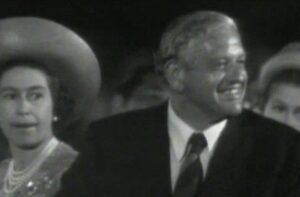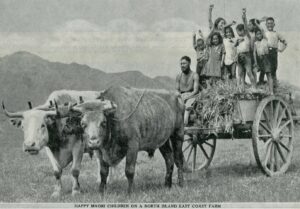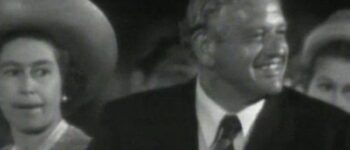1974: New Zealand Day at Waitangi
February 6, 2025
By AHNZ

Today in history, 6 February, 1974, our first New Zealand Day. A new national public holiday of which we would only ever enjoy three.
This one was kicked off with a great extravaganza at the Waitangi Treaty Grounds. Fresh from the Christchurch Commonwealth Games, The Queen was there. Howard Morrison sang about the Age of Aquarius to keep the Boomers happy. And, Prime Minister Norman Kirk gave a great speech before walking off in an iconic exit in hand with a little Maori boy¹.
It was all filmed and broadcast by the NZBC (New Zealand Broadcasting Corporation.) Prime Minister Kirk spoke to an audience at Waitangi of many Anglo Saxon and Maori New Zealanders as well as the viewers at home and the Queen herself: “An estimated 20,000 people were at the Waitangi Treaty House grounds tonight to celebrate the first New Zealand Day, in the presence of the Queen and other members of the Royal Family.”- Press
Waitangi Day did not yet exist, at least not as a national day. As a non-public holiday the sentiment was legislated for by Labour 2.0 in 1960. “Waitangi Day had barely registered with most New Zealanders. A public holiday only in Northland, it was seen as essentially a local event.” Ref. nzhistory.govt.nz
New Zealand Day became Waitangi Day in 1977, literally over Kirk’s dead body. The next, National 3.0 Government, captured and claimed the day and stuck their own name on it as all governments always do with all institutions wherever they are politicised. Sadly, New Zealanders are constantly asking for Big Brother to ‘take over’ everything you can imagine. Therefore, everything you can imagine is constantly being either replaced or destroyed by one or the other of a given political partisan group. Kiwis have every excuse for not keeping up with this ‘history’ since it’s always fairly new and always changing. Ref. 1970s: Kiwis have no idea when the Treaty of Waitangi was signed, AHNZ
It was in this New Zealand Day speech that Kirk referenced the fact that Maoris were migrating out of their ancestral grounds into the cities Westerners had built. We were merging into one people. Maoris were not leaving Aotearoa for there was no such place. They were coming to New Zealand and we welcomed them in. Ref. 1960s: The Second Great Migration, AHNZ
“Maori people, similarly, have not yet reached the end of the road. They are in the middle of a Great Migration as significant and meaningful as the migration that brought them to the shores of New Zealand. As they move from town to country, as the lifestyle changes, as the old traditions and the strength of history and culture are drawn upon, so new legends, new traditions, are in the making. Here in these isles great things are happening. All of us together are on our way. Making New Zealand.” – New Zealand Day speech, Kirk
Maoris once had their own parliament, legal system, prime minister, king, bank, councils,…their own parallel nations. About 50 years ago they gave that all up. 100 Years before that they legally gave it up when they joined the Colony of New Zealand. Maoris are welcome immigrants to New Zealand.
Maoris became de facto citizens, not in 1840, but in 1865 thanks to the last very Progressive gasp of the short-lived Weld Ministry. However nobody remembered this Native Rights Act or took it very seriously. When, in 1932, the Ratana Movement elected its first Member of Parliament, Edward Tregerthen (Eruera Tirikatene,) he naturally pushed for the key plank of that movement that the Treaty of Waitangi should be legislated for. This view would not win the day until the 1980s but an annual politicians’ pilgrimage on Bill Ratana’s birthday, 25 January, is the unofficial start of the political year in New Zealand. It is in this way that our quite recent democratic narrative is supplied with authentication and established lineage. However, in reality, you’ll find more heritage and longer lineage in a packet of chocolate biscuits.
 Eruera, in 1934, proselytised to codify The Treaty of Waitangi in law. This is something Labour 5.0’s Mike Moore tried to do in the 1990s and ACT’s David Seymour in 2025 (to much outrage.) Going back even further, Governor Robert FitzRoy tried to make the Treaty into law in the 1848 but a martial display of disapproving Maori warriors in Remuera ‘talked’ him out of it. The occasion for Eruera was that Governor General Charles Bledisloe had just purchased and restored and given us the Waitangi Treaty Grounds. Ref. 1934: First Waitangi Day, AHNZ
Eruera, in 1934, proselytised to codify The Treaty of Waitangi in law. This is something Labour 5.0’s Mike Moore tried to do in the 1990s and ACT’s David Seymour in 2025 (to much outrage.) Going back even further, Governor Robert FitzRoy tried to make the Treaty into law in the 1848 but a martial display of disapproving Maori warriors in Remuera ‘talked’ him out of it. The occasion for Eruera was that Governor General Charles Bledisloe had just purchased and restored and given us the Waitangi Treaty Grounds. Ref. 1934: First Waitangi Day, AHNZ
In reply the Prime Minister George Forbes and Native Affairs Minister Apirana Ngata pointed out that this would place the Maori on the same footing as the European. Is that really what Ratana wanted? Maoris would have to give up the enormous benefit of tax-free status. Ref. Auckland Star (1934,) Papers Past
Prior to immigrating to New Zealand, Maoris lived an idyllic and tax-free lifestyle in bucolic rural paradise.
As Kirk observed in his New Zealand Day speech, the draw of the metropolis drew Maoris in and they became part of building the post-war country we have today. Likewise, Pacific Islanders whose labour was also in demand but who simply had to travel further. That first generation, the Baby Boomers, felt great Culture Shock and were often Culturally Dislocated which made for a tumultuous and sometimes violent second half of the 1970s. Their Silent Generation elders put things right for a while (eg. Kohanga Reo Movement) but, like Kirk himself, they died or aged so that the Boomer Truth Narrative has become the lens of historical authority through which New Zealand views itself.
—
1 Kirk’s optics with this little Maori kid were so good that Whina Cooper replicated it the following year and these days it’s even a road sign! Ref. 2021: Marae Pedestrian Warning Sign
“Happy Māori children on a North Island East Coast farm.”, Auckland Weekly News, 30 June 1937, p.51, Auckland Libraries Heritage Collections; Timespanner
Ref. Unwise to make law. Provisions of Treaty, Auckland Star (1934,) Papers Past
Ref. Not on statute book. Treaty of Waitangi. Poverty Bay Herald (1934,) Papers Past
2 thoughts on "1974: New Zealand Day at Waitangi"
Leave a Reply
 Like Comment Share
Like Comment Share






Very few Maori living in Auckland 1950’s, my school photos show that. Early 50’s in Green Bay just one Maori family and one part Maori. It was almost rural then, gravel roads and cows in the paddock opposite us in Bishop st. The Manukau harbour was clean, at high tide with lovely still, clean safe beaches and going for a swim was the main recreation.
It hit me when I visited the Auckland Showgrounds and saw the photos on the wall. It seemed like that place was intruding on the modern world but actually it’s the other way around!